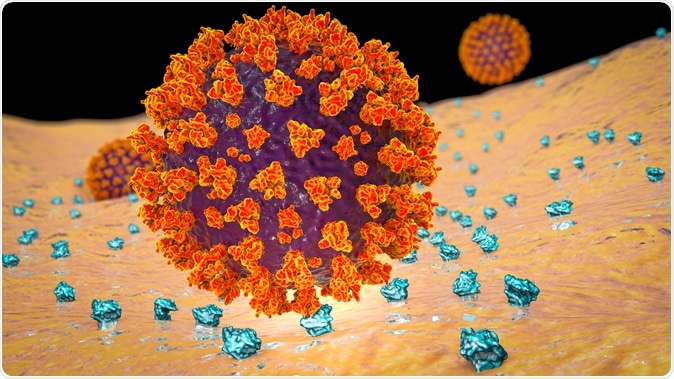New research shows that the novel coronavirus is undergoing mutations that could make it challenging to develop a vaccine against. There are a few vaccine candidates that are in the making to prevent COVID-19. With a potential for mutation, the vaccines that are being developed now may not work against the emergent mutated strains worry Taiwanese and Australian researchers.
The study is titled, “Analysis of the mutation dynamics of SARS-CoV-2 reveals the spread history and emergence of 2 RBD mutant with lower ACE2 binding affinity.” The study has not yet been peer-reviewed yet; however, the results look promising. The research is published on the preprint website bioRxiv.
What was the study about?
Officially over 2.4 million people across the world are infected with the novel coronavirus or severe acute respiratory syndrome coronavirus 2 (SARS-CoV-2) that causes COVID-19 disease. This newly classified disease has killed tens of thousands of individuals from different countries. The World Health Organization (WHO) has said that the development of the vaccine could be the only way this pandemic will be brought under control.
In this research, the scientists isolated samples of the virus from India and showed that this new virus had mutated from, and its spikes were different from the original samples.
The team wrote that it is critical to note the mutational changes in the SARS-CoV-2 virus in order to develop effective strategies to control it.
Low mutation rates
For this study, the team looked at 106 SARS-CoV-2 genome sequences and 39 SARS genome sequences. Their data reveals that this new virus has a much lower mutation rate compared to the original SARS virus. “The observation of this study raised the alarm that SARS-CoV-2 mutation with varied epitope [something an antibody attaches itself to] profile could arise at any time,” the researchers wrote. “[This] means current vaccine development against SARS-CoV-2 is at great risk of becoming futile.”
The team used “Minimum Evolution Phylogeny Analysis” and speculated on the origins of the coronavirus and its possible spread. They noted that there are different phylogenetic expressions of the spike protein. Notably, this spike protein on the surface of the virus is the vital part that acts as hooks and attaches to the host human cells. They noted that this spike protein-coding genome of the virus samples remained mostly unchanged throughout the advent of the virus and its course.

SARS-CoV-2 virus binding to ACE2 receptors on a human cell, the initial stage of COVID-19 infection, 3D illustration credit: Kateryna Kon / Shutterstock
Indian virus sample different
The team looked at the mutation in samples recovered from India. They found a mutation that led to a weaker “receptor binding capacity” of the virus. This sample was collected from India on 27th January 2020. The sample was from the state of Kerala and was analyzed only in March 2020. It was taken from a medical student who had returned from Wuhan China, where the disease had initially started. The researchers say that the genetic make-up of this virus, however, is different from the original samples found in Wuhan.
The team wrote, “This represents the first report of a significant SARS-CoV-2 mutant, and raises the alarm that the ongoing vaccine development may become futile in future epidemic if more mutations were identified.”
They noted that with this mutation, the Indian strain had a removal of a hydrogen bond from the spike protein. This made the virus less adherent to the ACE2 receptors on the host cells of the body. Notably, the virus binds to the ACE2 receptors on the host cells that can allow it to enter into the lung cells and other cells.
Implications
This study shows that unlike SARS in 2002 and 2003, the new SARS CoV-2 has a much lower rate of mutation and genetic diversity. This study reveals that the gene that codes for the spike protein on the SARS-CoV-2 is one of the more “conserved” protein-coding genes. This means that the spike proteins do not change much even after mutations. This could be “a good indication for the ongoing antiviral drug and vaccine development.”
The researchers also confirmed that the changes in the spike protein arrangement of the SARS CoV-2 and said that this rearrangement should have been seen among human SARS-CoV-2 and bat strain of SARS CoV-2 before the virus was transmitted from bats to humans.
The team of researchers concluded, “We provided the first evidence that a mutated SARS-COV-2 with reduced human ACE2 receptor binding affinity have emerged in India based on a sample collected on 27th January 2020.”
At present, there are 70 vaccine candidates that are in several stages of trials. It is expected that one of the leading vaccines would be available for human use by mid next year. Meanwhile, if the virus undergoes more severe mutations, it could mean that the whole efforts of vaccine development could be derailed, and researchers may need to start work again. Since the risk of genetic mutations is lower, there could be hope for the vaccines in the pipeline, say researchers.
Important Notice
bioRxiv publishes preliminary scientific reports that are not peer-reviewed and, therefore, not be regarded as conclusive, guide clinical practice/health-related behavior, or treated as established information.
Sources:
Journal reference:
- Analysis of the mutation dynamics of SARS-CoV-2 reveals the spread history and emergence of RBD mutant with lower ACE2 binding affinity Yong Jia, Gangxu Shen, Yujuan Zhang, Keng-Shiang Huang, Hsing-Ying Ho, Wei-Shio Hor, Chih-Hui Yang, Chengdao Li, Wei-Lung Wang bioRxiv 2020.04.09.034942; doi: https://doi.org/10.1101/2020.04.09.034942